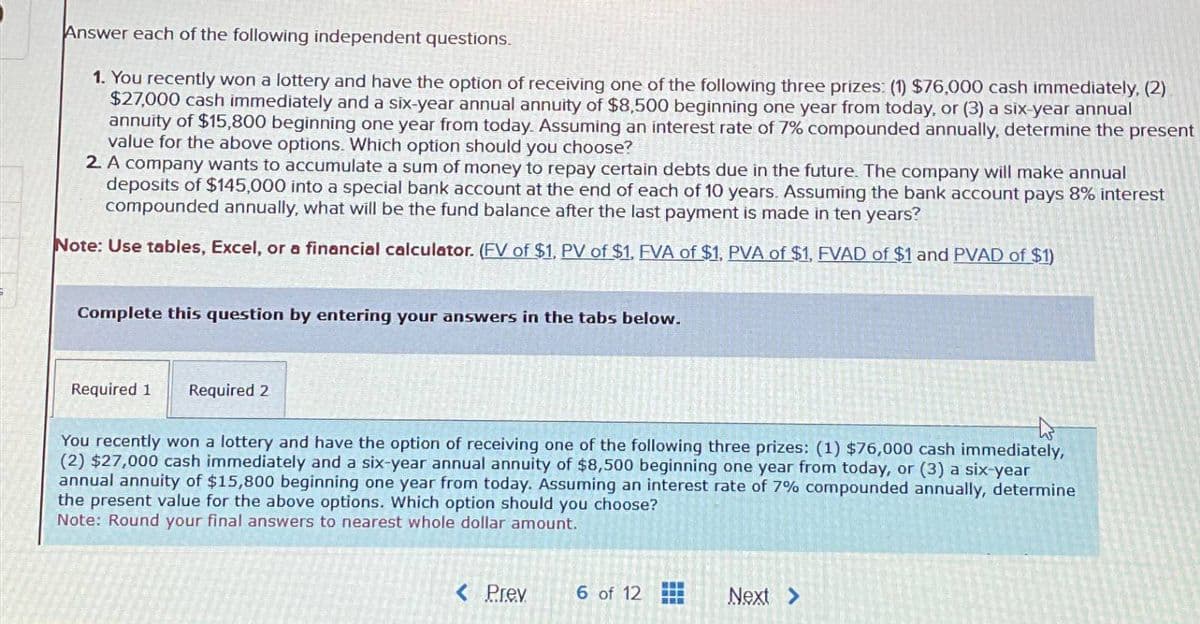Answer each of the following independent questions. 1. You recently won a lottery and have the option of receiving one of the following three prizes: (1) $76,000 cash immediately. (2) $27,000 cash immediately and a six-year annual annuity of $8,500 beginning one year from today, or (3) a six-year annual annuity of $15,800 beginning one year from today. Assuming an interest rate of 7% compounded annually, determine the present value for the above options. Which option should you choose? 2. A company wants to accumulate a sum of money to repay certain debts due in the future. The company will make annual deposits of $145,000 into a special bank account at the end of each of 10 years. Assuming the bank account pays 8% interest compounded annually, what will be the fund balance after the last payment is made in ten years? Note: Use tables, Excel, or a financial calculator. (FV of $1, PV of $1. EVA of $1, PVA of $1, FVAD of $1 and PVAD of $1) Complete this question by entering your answers in the tabs below. Required 1 Required 2 You recently won a lottery and have the option of receiving one of the following three prizes: (1) $76,000 cash immediately, (2) $27,000 cash immediately and a six-year annual annuity of $8,500 beginning one year from today, or (3) a six-year annual annuity of $15,800 beginning one year from today. Assuming an interest rate of 7% compounded annually, determine the present value for the above options. Which option should you choose? Note: Round your final answers to nearest whole dollar amount. < Prev 6 of 12 Next >
Answer each of the following independent questions. 1. You recently won a lottery and have the option of receiving one of the following three prizes: (1) $76,000 cash immediately. (2) $27,000 cash immediately and a six-year annual annuity of $8,500 beginning one year from today, or (3) a six-year annual annuity of $15,800 beginning one year from today. Assuming an interest rate of 7% compounded annually, determine the present value for the above options. Which option should you choose? 2. A company wants to accumulate a sum of money to repay certain debts due in the future. The company will make annual deposits of $145,000 into a special bank account at the end of each of 10 years. Assuming the bank account pays 8% interest compounded annually, what will be the fund balance after the last payment is made in ten years? Note: Use tables, Excel, or a financial calculator. (FV of $1, PV of $1. EVA of $1, PVA of $1, FVAD of $1 and PVAD of $1) Complete this question by entering your answers in the tabs below. Required 1 Required 2 You recently won a lottery and have the option of receiving one of the following three prizes: (1) $76,000 cash immediately, (2) $27,000 cash immediately and a six-year annual annuity of $8,500 beginning one year from today, or (3) a six-year annual annuity of $15,800 beginning one year from today. Assuming an interest rate of 7% compounded annually, determine the present value for the above options. Which option should you choose? Note: Round your final answers to nearest whole dollar amount. < Prev 6 of 12 Next >
Intermediate Accounting: Reporting And Analysis
3rd Edition
ISBN:9781337788281
Author:James M. Wahlen, Jefferson P. Jones, Donald Pagach
Publisher:James M. Wahlen, Jefferson P. Jones, Donald Pagach
ChapterM: Time Value Of Money Module
Section: Chapter Questions
Problem 11E
Related questions
Question

Transcribed Image Text:Answer each of the following independent questions.
1. You recently won a lottery and have the option of receiving one of the following three prizes: (1) $76,000 cash immediately. (2)
$27,000 cash immediately and a six-year annual annuity of $8,500 beginning one year from today, or (3) a six-year annual
annuity of $15,800 beginning one year from today. Assuming an interest rate of 7% compounded annually, determine the present
value for the above options. Which option should you choose?
2. A company wants to accumulate a sum of money to repay certain debts due in the future. The company will make annual
deposits of $145,000 into a special bank account at the end of each of 10 years. Assuming the bank account pays 8% interest
compounded annually, what will be the fund balance after the last payment is made in ten years?
Note: Use tables, Excel, or a financial calculator. (FV of $1, PV of $1. EVA of $1, PVA of $1, FVAD of $1 and PVAD of $1)
Complete this question by entering your answers in the tabs below.
Required 1
Required 2
You recently won a lottery and have the option of receiving one of the following three prizes: (1) $76,000 cash immediately,
(2) $27,000 cash immediately and a six-year annual annuity of $8,500 beginning one year from today, or (3) a six-year
annual annuity of $15,800 beginning one year from today. Assuming an interest rate of 7% compounded annually, determine
the present value for the above options. Which option should you choose?
Note: Round your final answers to nearest whole dollar amount.
< Prev
6 of 12
Next >
Expert Solution
This question has been solved!
Explore an expertly crafted, step-by-step solution for a thorough understanding of key concepts.
Step by step
Solved in 2 steps with 2 images

Recommended textbooks for you

Intermediate Accounting: Reporting And Analysis
Accounting
ISBN:
9781337788281
Author:
James M. Wahlen, Jefferson P. Jones, Donald Pagach
Publisher:
Cengage Learning

Financial Accounting: The Impact on Decision Make…
Accounting
ISBN:
9781305654174
Author:
Gary A. Porter, Curtis L. Norton
Publisher:
Cengage Learning

Excel Applications for Accounting Principles
Accounting
ISBN:
9781111581565
Author:
Gaylord N. Smith
Publisher:
Cengage Learning

Intermediate Accounting: Reporting And Analysis
Accounting
ISBN:
9781337788281
Author:
James M. Wahlen, Jefferson P. Jones, Donald Pagach
Publisher:
Cengage Learning

Financial Accounting: The Impact on Decision Make…
Accounting
ISBN:
9781305654174
Author:
Gary A. Porter, Curtis L. Norton
Publisher:
Cengage Learning

Excel Applications for Accounting Principles
Accounting
ISBN:
9781111581565
Author:
Gaylord N. Smith
Publisher:
Cengage Learning